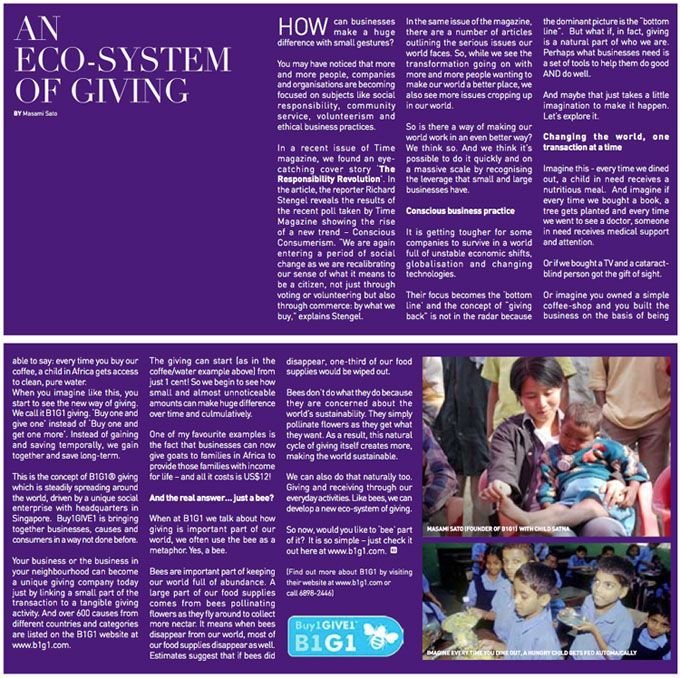GOOD PAPER – AN ECO-SYSTEM OF GIVING

How can businesses make a huge difference with small gestures?
You may have noticed that more and more people, companies and organisations are becoming focused on subjects like social responsibility, community service, volunteerism and ethical business practices. In a recent issue of Time magazine, we found an eyecatching cover story ‘The Responsibility Revolution’. In the article, the reporter Richard Stengel reveals the results of the recent poll taken by Time Magazine showing the rise of a new trend – Conscious Consumerism.
“We are again entering a period of social change as we are recalibrating our sense of what it means to be a citizen, not just through voting or volunteering but also through commerce: by what we buy” explains Stengel.
In the same issue of the magazine, there are a number of articles outlining the serious issues our world faces. So, while we see the transformation going on with more and more people wanting to make our world a better place, we also see more issues cropping up in our world.
So is there a way of making our world work in an even better way? We think so. And we think it’s possible to do it quickly and on a massive scale by recognising the leverage that small and large businesses have
CONSCIOUS BUSINESS PRACTICE
It is getting tougher for some companies to survive in a world full of unstable economic shifts, globalisation and changing technologies. Their focus becomes the ‘bottom line’ and the concept of “giving back” is not in the radar because the dominant picture is the “bottom line”. But what if, in fact, giving is a natural part of who we are. Perhaps what businesses need is a set of tools to help them do good AND do well.
And maybe that just takes a little imagination to make it happen. Let’s explore it.
CHANGING THE WORLD, ONE TRANSACTION AT A TIME
Imagine this – every time we dined out, a child in need receives a nutritious meal. And imagine if every time we bought a book, a tree gets planted and every time we went to see a doctor, someone in need receives medical support and attention.
Or if we bought a TV and a cataractblind person got the gift of sight. Or imagine you owned a simple coffee-shop and you built the business on the basis of being able to say: every time you buy our coffee, a child in Africa gets access to clean, pure water.
When you imagine like this, you start to see the new way of giving. We call it B1G1 giving. ‘Buy one and give one’ instead of ‘Buy one and get one more’. Instead of gaining and saving temporally, we gain together and save long-term. This is the concept of B1G1® giving which is steadily spreading around the world, driven by a unique social enterprise with headquarters in Singapore.
Buy1GIVE1 is bringing together businesses, causes and consumers in a way not done before. Your business or the business in your neighbourhood can become a unique giving company today just by linking a small part of the transaction to a tangible giving activity. And over 600 causes from different countries and categories are listed on the B1G1 website at www.b1g1.com.
The giving can start (as in the coffee/water example above) from just 1 cent! So we begin to see how small and almost unnoticeable amounts can make huge difference over time and culmulatively.
One of my favourite examples is the fact that businesses can now give goats to families in Africa to provide those families with income for life – and all it costs is US$12!
AND THE REAL ANSWER… JUST A BEE?
When at B1G1 we talk about how giving is important part of our world, we often use the bee as a metaphor. Yes, a bee.
Bees are important part of keeping our world full of abundance. A large part of our food supplies comes from bees pollinating flowers as they fly around to collect more nectar. It means when bees disappear from our world, most of our food supplies disappear as well. Estimates suggest that if bees did disappear, one-third of our food supplies would be wiped out. Bees don’t do what they do because they are concerned about the world’s sustainability. They simply pollinate flowers as they get what they want. As a result, this natural cycle of giving itself creates more, making the world sustainable.
We can also do that naturally too. Giving and receiving through our everyday activities. Like bees, we can develop a new eco-system of giving.
So now, would you like to ‘bee’ part of it? It is so simple – just check it out here at www.b1g1.com.HAVE A STORY IDEA?hello@b1g1.com
